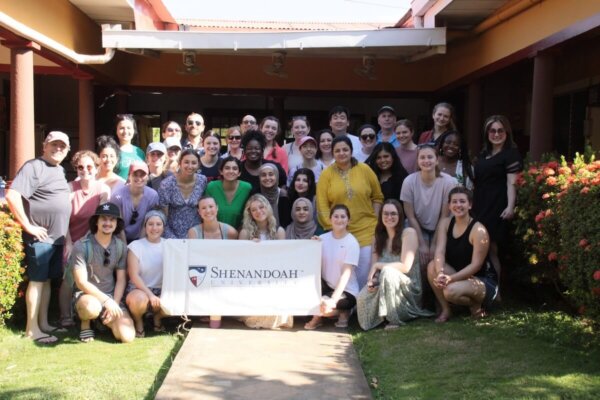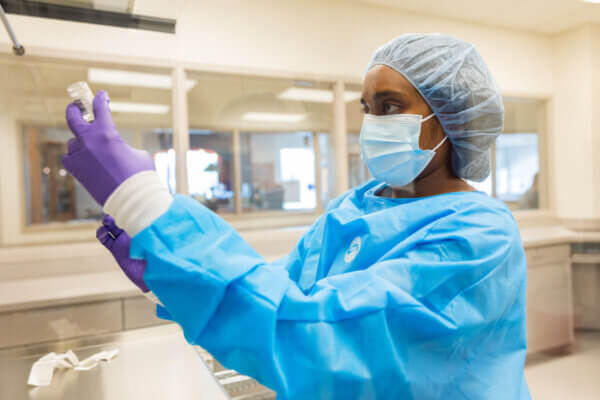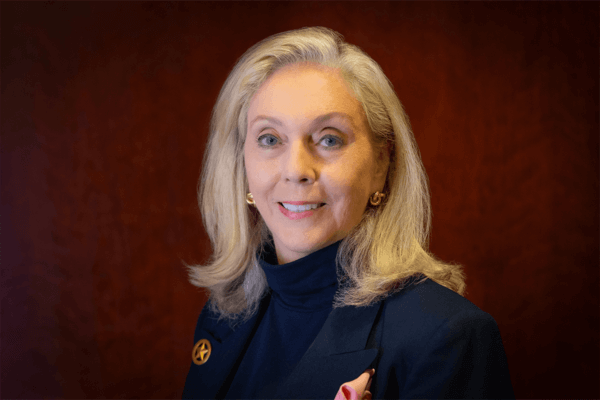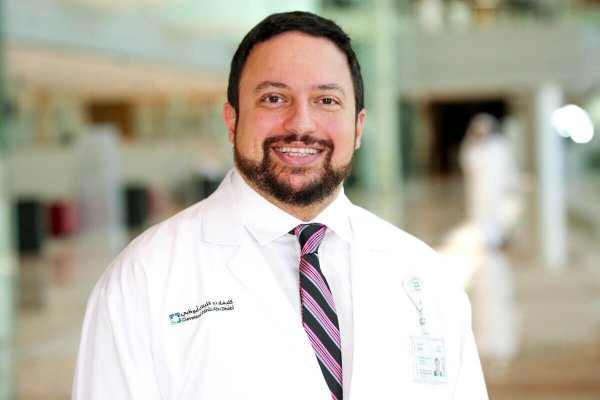Shenandoah University’s School of Pharmacy has TWO fully accredited pathways to earn your Pharm.D.:
- In-person, on the campus of a regional medical center an hour west of the D.C. metro area, or
- Through our NEW online hybrid pathway
Our new online hybrid pathway:
- Builds on our extensive experience in distance/online education
- Features mostly asynchronous coursework, so you can learn where you live
- Includes only two campus visits per semester, with each visit lasting less than a week
All students, both in-person and online, have:
- An array of resources, including an Apple MacBook, iPad and Apple Pencil as well as an extensive online resource library, at no additional cost
- Excellent clinical rotations
- Individualized attention from faculty
- Scholarships awarded to all admitted students
- All-inclusive tuition and fees
- Extensive research opportunities
Students in both pathways may also earn one of our dual graduate degrees:
- Pharm.D./Master of Business Administration
- Pharm.D./M.S. in Pharmacogenomics & Personalized Medicine
- Pharm.D./Master of Public Health
Learn More About This Program
Pursue your passion for serving others as a pharmacist.
Shenandoah University’s Bernard J. Dunn School of Pharmacy prepares you to meet the challenges of today’s evolving health care industry, effectively serve patients in a diverse range of settings and become a valued member of the pharmacy profession. Our nationally recognized pharmacy program offers several degree pathways and students have the choice to study online and at our campus in Winchester Virginia, just 1 hour west of D.C.
Today’s pharmacists serve as experts in drug information, drug dosing, patient assessment, advocacy, and pharmacotherapy. You’ll learn to observe changes in the health care industry and to interpret how those changes will impact your role as a pharmacist. Through interactive classroom work and experiential learning, you’ll become a caring, effective pharmacist prepared to deliver individualized, patient-focused care and to serve as a vital member of the health care team.
Our program exposes you to different areas of pharmacy practice as well as cross-collaborates with our broad range of health profession offerings. We give you opportunities to participate in numerous forms of research, community service, medical mission trips, domestically and internationally, and with outside service groups like Project Hope. Our many student organizations, connections with industry, and ties with government agencies allow you to get involved, gain experience and develop leadership skills in the pharmacy fields that interest you most.
Meet the Faculty
The Bernard J. Dunn School of Pharmacy recruits faculty who are accomplished teachers, researchers, and clinicians.
You’ll enjoy close relationships with faculty who are caring, accessible and dedicated to preparing you for your role as pharmacist. During your first semester, you’ll partner with your own faculty adviser who will provide you with guidance for the duration of the program.
My favorite part of Shenandoah is the professors. They’re so smart and have so much to teach you. I really like the open-door policy; you can just walk in and talk to them.”
Bathsheba Teshome ’25 | Doctor of Pharmacy
While our faculty is actively engaged in research and scholarship, your education remains their number one priority.
Career Possibilities
Our graduates obtain positions as retail pharmacists, hospital pharmacists, long-term care pharmacists, clinical pharmacists, and many other pharmacy-related industry and research positions.
Pharmacy is a highly respected profession that is both challenging and rewarding. It offers many career opportunities in areas such as clinical pharmacy, nuclear pharmacy, home infusion therapy, industry, managed care, general hospital, and community pharmacy.
In May 2017, a tanker-truck bombing in Kabul, Afghanistan, killed more than 150 people. Nazila Raofi Salamkhail ’17 was in the city on a two-week-long humanitarian trip to serve her home country and was able to assist the injured at local hospitals. “Being present at the scene and helping the injured and their families gave me a little comfort as a person, and as a healthcare professional, to be able to help when and where needed the most. I returned to Afghanistan after more than 20 years. I wanted to work as an intermediary and serve as a bridge between the healthcare professionals in the United States and our counterparts in Afghanistan. I wanted to introduce the healthcare professionals in Afghanistan to the new technologies and evidence-based treatments used by the healthcare professionals in the U.S, and at the same time, look into possible new disease states prevalent in a third world setting which could open new venues of research and understanding of our colleagues, enriching the field of research in the U.S.”
Stephen Creasy ’10 is director of clinical services for PharMerica. “Shenandoah provided a strong foundation of didactic knowledge and also provided me with several opportunities to be involved in various organizations.”
After graduating from Shenandoah, Katelyn Miller Overstreet ’12 is now a project manager for the Food and Drug Administration (FDA) under the United States Public Health Service (PHS). Overstreet found this opportunity from our Bernard J. Dunn School of Pharmacy. The Pharmacy faculty and preceptors were supportive and helpful throughout her years at Shenandoah and during the process of her application to PHS. Overstreet’s advice to students is, “Take time to enjoy opportunities and events that will not be available once you graduate.”
Classes
Our dynamic Doctor of Pharmacy (Pharm.D.) curriculum is designed to meet the educational needs of pharmacists for the future.
You’ll receive a comprehensive and rigorous pharmacy education that blends interactive classroom work with opportunities to work with practitioners in a variety of exciting pharmacy practice environments.
Our program’s integrated curriculum design provides you with a holistic learning experience. This unique modular approach enables you to master the interactions and connections between such subjects as anatomy, physiology, biochemistry and pharmacology.
Shenandoah’s emphasis on pharmacogenomics prepares you for the innovative future of pharmacy and new trends in personalized medicine. We help you gain a deep understanding of how healthcare can be improved as pharmacists utilize an individual’s unique genetic composition to create personalized medicine and maximize drug safety and efficacy.
The experiential component of the curriculum affords students the opportunity to work with practitioners in a variety of exciting practice environments. This diverse training program allows students to explore different areas of pharmacy practice while gaining a wealth of practical experience.
Our Winchester campus features “smart classrooms” that integrate a variety of technologies and provide you with interactive learning experiences. Live lectures are captured on video, while smartphone and audio technology give you 24/7 access to the material beyond the classroom. Curricular materials are developed as web-based documents so that notes, slides and lecture outlines can be available to you prior to classes and from any computer with Internet access.
I experienced so much personal and professional growth at Shenandoah University and a large part of that was because of the remarkable faculty members who work incredibly hard to help the students succeed, whether it was in the classroom, with extracurricular activities or at a practice site. I found many mentors who provided me with endless guidance and unique opportunities that allowed me to pave my own path in the profession of pharmacy.”
Gina Fu | Chemistry ’14, Pharmacy ’17
Step-By-Step Course Requirements
The traditional Doctor of Pharmacy curriculum is comprised of 149 semester credit hours spanning 8 semesters in 4 academic years, and it is both horizontally and vertically integrated.
First Professional Year (P1)
| Course | Title | Hrs. |
|---|---|---|
| First Professional Year, Fall | ||
| PHAR 500 | Introduction to the Pharmacy Profession | 1.5 |
| PHAR 508 | Pharmaceutics I (Calculations) | 2 |
| PHAR 516 | Introductory Pharmacy Practice Experience I | 2 |
| PHAR 519 | Introduction to Physical Assessment | 1 |
| PHAR 521 | Biomedical Sciences I | 2 |
| PHAR 522 | Biomedical Sciences II | 3 |
| PHAR 533 | Communications in Pharmacy Practice | 2.5 |
| PHAR 520 | Physical Assessment Lab | 1 |
| PHAR 550 | Outpatient Pharmacy Practice Lab | 1 |
| Subtotal | 17 | |
| First Professional Year, Spring | ||
| PHAR 512 | Pharmaceutics II | 4 |
| PHAR 513 | Pharmaceutics and Compounding Lab | 1 |
| PHAR 549 | Nonprescription Products | 3 |
| PHAR 534 | Essentials of Pharmacogenomics | 2 |
| PHAR 537 | Integrated Pathophysiology I | 3 |
| PHAR 538 | Integrated Pathophysiology II | 3 |
| PHAR 552 | Drug Information Skills | 2 |
| PHAR 539 | Pharmacy Professional Dev Lab I | 0.5 |
| Subtotal | 18.5 | |
The first professional year is comprised of 34.5 semester credit hours of the 17 courses. The P1 year is highly integrated and designed to build upon the prerequisite coursework and provide foundation for the rest of the professional curriculum. A key portion of the P1 year is the Biomedical Sciences and Integrated Pathophysiology courses sequence, which accounts for 11 semester credit hours.
Biomedical Sciences incorporates topics such as Biochemistry, Cell Biology, Molecular Biology and Immunology that serve as a foundation for pathophysiology, pharmacology, pharmacogenomics and other areas of the pharmacy profession, and will appraise how these biomedical processes apply to pharmacists. Integrated Pathophysiology uses a systems-based approach regarding common disease states as relevant to pharmacists.
Other foundational coursework in the P1 year includes Pharmaceutics I (pharmacy calculations), Pharmaceutics II (physical pharmacy and biopharmaceutics), Communications in Pharmacy Practice, Non-prescription Products, Physical Assessment and Essentials of Pharmacogenomics. Introduction to the Pharmacy Profession offers opportunities to learn about information systems in addition to learning about pharmacy practice options.
The School of Pharmacy incorporates Introductory Pharmacy Practice Experience (IPPE) rotations into the curriculum, to ensure adequate exposure to pharmacy practice environments. These introductory experiences will augment the learning process in the classroom, develop foundational pharmacy practice skills and foster professionalism to prepare students for their Advanced Pharmacy Practice Experiences (APPE) in the final, P4 year.
IPPEs provide students an opportunity to gain experience in a community pharmacy setting by directly interacting with patients, and indirectly in a health-system pharmacy setting, in the Winchester, Northern Virginia, and surrounding areas.
Second Professional Year (P2)
| Course | Title | Hrs. |
| Second Professional Year, Fall | ||
| PHAR 600 | Pharmacokinetic Principles | 3 |
| PHAR 681 | ICare: General Med I | 3 |
| PHAR 668 | Pharmacology | 4 |
| PHAR 662 | Drug Literature Analysis & Interpretation | 3 |
| PHAR 663 | Drug Literature Analysis & Interpretation Lab | 1 |
| PHAR 679 | Federal and State Pharmacy Law | 2 |
| PHAR 682 | Introduction to Patient Centered Care | 1.5 |
| PHAR 667 | Introductory Pharmacy Practice Experience III | 3* |
| Subtotal | 18.5 | |
| Second Professional Year, Spring | ||
| PHAR 608 | ICare: Renal | 2 |
| PHAR 619 | ICare: Cardiovascular | 4 |
| PHAR 632 | Applied Pharmacokinetics and Pharmacogenomics I | 1 |
| PHAR 671 | Toxicology | 2 |
| PHAR 669 | Health Information Technology and Practice Management | 3 |
| PHAR 678 | Patient Centered Care I | 2 |
| PHAR 680 | Pharmacy Professional Dev Lab II | 0.5 |
| Professional Elective | 3 | |
| Subtotal | 17.5 | |
*IPPE II is completed in the summer before the P2 Fall semester
The second professional year is comprised of 36 semester credit hours in 16 courses. In the P2 year curriculum, student knowledge regarding methods for managing the clinical literature and the tools necessary to critically evaluating the data in the literature are strengthened through participation in the Drug Literature Analysis and Interpretation course and lab. Additional foundation courses taught in the P2 year include Pharmacokinetics, Pharmacology, Pharmacy Law, Toxicology, and Health Information Technology and Practice management.
The Integrated Pharmaceutical Care and Science (ICare) courses sequence begins the fall semester of the P2 year. ICare consists of nine modules of sequenced and integrated courses spanning four semesters focusing on the pathophysiology of common diseases, as well as the chemical, pharmacodynamic, and pharmacokinetic properties of the drugs used to treat these diseases, and the therapeutic management of patients utilizing current guidelines and evidenced based medicine. The ICare modules in the P2 year include General Medicine I, Renal, and Cardiovascular.
Introductory Pharmacy Practice Experiences provide students an opportunity to gain experience in a community and a health-system pharmacy setting by directly interacting with patients in the Winchester, Northern Virginia, and surrounding areas. Students may elect to complete some of the hours in a direct patient care site such as an ambulatory care or an acute care pharmacy.
The students also take three semester credit hours of electives during the spring P2 year.
Third Professional Year (P3)
| Course | Title | Hrs. |
| Third Professional Year, Fall | ||
| PHAR 746 | ICare: Endocrine | 2 |
| PHAR 709 | ICare: Hematology/Oncology | 3 |
| PHAR 742 | ICare: Infectious Diseases | 4 |
| PHAR 723 | Patient Centered Care II | 2 |
| PHAR 733 | Applied Pharmacokinetics and Pharmacogenomics II | 1 |
| PHAR 736 | Pharmacy Administration I | 2 |
| PHAR 738 | IPPE III | 2* |
| PHAR 744 | Essentials of Research Design | 1 |
| Professional Elective | 3 | |
| Subtotal | 18 | |
| Third Professional Year, Spring | ||
| PHAR 747 | ICare: General Med II | 2 |
| PHAR 748 | ICare: Special Populations | 2 |
| PHAR 720 | ICare: Neuro/Psychiatry | 3 |
| PHAR 724 | Patient Centered Care III | 2 |
| PHAR 734 | Applied Pharmacokinetics and Pharmacogenomics III | 1 |
| PHAR 737 | Pharmacy Administration II | 3 |
| PHAR 745 | Pharmacy Professional Dev Lab III | 0.5 |
| Professional Elective(s) | 3 | |
| Subtotal | 16.5 | |
*IPPE III is completed in the summer before the P3 Fall semester
The third professional year is comprised of 36.5 semester credit hours in 17 courses. A major portion of the P3 year is the ICare lecture courses sequence and patient assessment course, which accounts for 21 semester credit hours. The ICare modules in the P3 year include Infectious Disease, Special Populations, Endocrine, Neurosensory/ Psychiatry, and Hematology/Oncology.
Pharmacy Administration I and II, provide students with management skills and knowledge of the health care system. Finally, six semester credit hours of professional elective(s) complete the P3 coursework.
Introductory Pharmacy Practice Experiences provide students an opportunity to gain experience in an acute care or ambulatory care setting by directly interacting with patients in the Winchester, Northern Virginia, and surrounding areas.
Fourth Professional Year (P4)
| Course | Title | Hrs. |
| Fourth Professional Year | ||
| PHAR 811 | Advanced Pharmacy Practice Exp I | 5 |
| PHAR 812 | Advanced Pharmacy Practice Exp II | 5 |
| PHAR 813 | Advanced Pharmacy Practice Exp III | 5 |
| PHAR 814 | Advanced Pharmacy Practice Exp IV | 5 |
| PHAR 815 | Advanced Pharmacy Practice Exp V | 5 |
| PHAR 816 | Advanced Pharmacy Practice Exp VI | 5 |
| PHAR 817 | Advanced Pharmacy Practice Exp VII | 5 |
| PHAR 818 | Advanced Pharmacy Practice Exp VIII | 5 |
| Subtotal | 40 | |
| Total | 149 | |
The fourth professional year, our Advanced Practice Experience consists of eight specific course rotations totaling 40 semester credit hours. The P4 curriculum consists of eight APPE rotations (ambulatory care, community, institutional, in-patient acute care, and four elective rotations).
The rotations are scheduled in five-week units. These advanced experiential education courses allow the student to learn and demonstrate the knowledge, skills, attitudes, and abilities required to be a practicing pharmacist.
Beyond The Classroom
The Bernard J. Dunn School of Pharmacy, working closely with the Winchester Medical Center and nationwide pharmacy operations, provides the required experiential education and clinical training sites for the Pharm.D. curriculum. A majority of sites are located within five clusters: Winchester, Virginia; Martinsburg, West Virginia; Roanoke, Virginia; Charlottesville, Virginia; and Northern Virginia.
Other opportunities include Project Hope and medical mission trips. Our reasonably close proximity to Washington, D.C. allows for access to the National Institutes of Health, Food & Drug Administration, Centers for Medicare and Medicaid Services.
Shenandoah University helps me to prepare to pass my professional exams, largely due to the amazing faculty we have here. Clinical experiences are beneficial because they allow me to apply what I’ve learned in the classroom in the real world with real patients. I’ve participated in many clinical experiences so far, from retail settings at CVS and Walgreens, to working at a veteran’s hospital. There are also a number of international trips for pharmacy students, including a medical mission trip to Nicaragua and a clinical rotation trip with Project Hope to Honduras and the Dominican Republic.”
—Gina Fu | Chemistry ’14, Pharmacy ’17
Student Research Opportunities
A variety of research opportunities are available for students, including the basic and applied sciences. Research laboratories are currently being used primarily for basic pharmaceutics, pharmacogenetic, and medicinal plant research. Labs are equipped with instrumentation for selective procedures including HPLC, automatic DNA isolation, real time PCR for pharmacogenetic analyses.
Application Information
Admission to the Bernard J. Dunn School of Pharmacy occurs once a year for entrance into a fall cohort.
Pharmacy Application Information
Doctor Of Pharmacy (Pharm.D.) Prerequisites
| Course | Semester Credit Hours |
| English I | 3 |
| English II | 3 |
| General Biology I + lab | 4 |
| General Biology II + lab | 4 |
| General Chemistry I + lab | 4 |
| General Chemistry II + lab | 4 |
| Organic Chemistry I + lab | 4 |
| Physics | 3 |
| College Algebra or higher | 3 |
| Statistics | 3 |
| Economics | 3 |
| Microbiology | 3 |
| Human Anatomy & Physiology | 6 |
| Advanced Biology or Chemistry Electives | 6 |
| Humanities | 3 |
| Social/Behavioral Science | 3 |
| Total Combined Hours | 59 |




